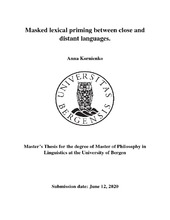Masked lexical priming between close and distant languages
Master thesis
Permanent lenke
https://hdl.handle.net/1956/23074Utgivelsesdato
2020-06-27Metadata
Vis full innførselSamlinger
- Master theses [274]
Sammendrag
The masked priming effect from L2 to L1 (where L1 is a native language) was reported where meaning priming were strongest. In our experiment conducted in 2018 (“Form and meaning effects: cross-linguistic priming Norwegian Russian”) the findings demonstrated a different result: the form priming is stronger than meaning priming. In the present research, we examined the relation between meaning and form in a masked priming cross-linguistic experiment. The experiment was a lexical decision task. Twenty-two Russian-Ukrainian-Norwegian trilingual subjects participated where Russian is the mother tongue along with Ukrainian (balanced bilinguals) and Norwegian is a language learnt when moved to Norway. Word pairs having a relation between prime stimuli and target stimuli were from four groups: cognates (the same meaning and form), false friends (the same form with different meaning), translations (the same meaning with different form) and unrelated (different meaning and form). Each group consisted of 10 words pairs. One hypothesis was that there would be a stronger priming effect from Ukrainian (L2) primed words than from Norwegian (L3) primed words. Another hypothesis was that Norwegian words (L3) will have more significant priming effect on meaning related target words for Russian Native Speakers (L1) than Ukrainian words (L2). The findings show meaning effect advantage over the form in both experiments. The results show more significant priming effect in Form for the L1 (Russian) words primed by L2 (Ukrainian) words than those primed by L3 (Norwegian) words. This supports the hypotheses.
